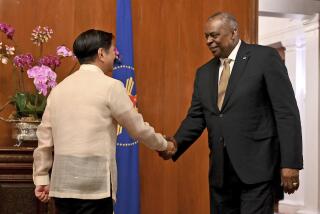Subic Bay May Serve as Model for Closed Bases : Defense conversion: The Philippines inherited the giant U.S. Navy facility and is creating a free port to attract business.
So you’re left with a former U.S. Navy base complete with airport and modern facilities, at least 42,000 highly skilled workers and a lot of hope. What’s a former mayor to do?
Recruit businesses, says Richard Gordon.
Gordon has a challenge that many American localities will soon face: converting a closed military facility to commercial use. But Gordon’s story comes from thousands of miles across the Pacific at the former Subic Bay Naval Base in the Philippines.
Gordon, who had been mayor for 13 years of the base’s adjacent city of Olongapo, came to Los Angeles last week as part of an eight-city U.S. tour, pitching the benefits of what is now called Subic Bay Freeport to American multinational companies, chambers of commerce and anyone else who will listen.
Gordon, now chairman of the newly created Subic Bay Metropolitan Authority, wants to make the Subic Bay Freeport into a major international economic center that would be home for light-manufacturing industries, tourism and seaport operations. So far, the project has final commitments from several Southeast Asian companies and two Houston-based American companies.
“You are now seeing the beginning of growth in the Philippines,” said Gordon, 47. “We are going to build a second city.”
To succeed, Gordon and thousands of Filipino volunteers must overcome a legacy of political corruption and broken government promises that have discouraged many U.S. businesses from moving to the Philippines.
He knows his mission is particularly critical to the 320,000 Olongapo citizens who live around the base. The base, opened in 1904 and strengthened during the height of the Cold War, had been their savior. But many became unemployed after 1991 when a rise in anti-American sentiment led the Philippine Senate to refuse to renew a 10-year lease under which the American government would have paid $203 million a year.
Like many American cities faced with base closings, Olongapo must learn to survive without the military dollar. Gordon plans to come back to the United States in December to attend a conference of American mayors faced with base closings.
Gordon’s advice to the mayors: find your niche. “The Philippines is a hub country for hub business,” he said, noting that Subic gives companies central access to Pacific Rim markets ranging from Japan to Singapore.
But Gordon believes he has some advantages over American cities facing base closings, as he can offer cheaper labor and rent to go with its extensive infrastructure. One of his strong selling points is that businesses would get U.S. Navy-trained, highly skilled, English-speaking workers who will work for one-fourth the price of their counterparts in the United States.
Once the largest U.S. Navy base in Asia, Subic also offers a slew of modern facilities. The U.S. Navy left behind a complex that includes an airport capable of handling Boeing 747s, an oil depot, a telecommunications network, an extensive ship-repair and docking yard, more than 1,000 industrial and commercial buildings, 1,876 air-conditioned residential homes and dozens of recreational facilities from tennis courts to an 18-hole golf course.
In addition, the 148,200-acre area around Subic, including the 17,300-acre former base, was officially declared a free port zone by the Philippine government. That allows for duty-free imports and unlimited repatriation of profits. It also exempts companies from national and local property and income taxes. Companies in the zone will be asked to pay a 5% tax on gross income after deducting salaries, production costs, utility charges and a host of other costs.
“We don’t want your money,” Gordon told a group of Los Angeles companies. “We want your good corporate citizenship.”
But Gordon acknowledges that attracting U.S. business will require some convincing. Some American firms still judge the country based on its past political instability and the legacy of the former Marcos and Aquino governments.
But now the atmosphere is truly different, Gordon says. For one, Subic Bay’s status as a special economic zone eliminates much government red tape and allows Gordon to take a staunch, the-buck-stops-here approach.
“We will not change the rules in the middle of the game,” he promises.
And attitudes have definitely changed, he says. Politicians who lobbied to end the U.S. government’s lease are now supporting Gordon’s efforts. In addition, the region’s people are strongly committed to developing Subic. Unlike former Clark Air Force Base, which was thoroughly looted once the U.S. Air Force pulled out, Subic is being well-maintained by 8,000 volunteers who are counting on a brighter future, Gordon says.
Even outside observers say the mood has changed. The administration of President Fidel Ramos seems to have more business sense than previous regimes, said Richard Drobnick, director of the International Business Education and Research program at USC.
“What they exuded was a competence, an experience-level of dealing with business I didn’t see in the previous administrations,” Drobnick said in describing Gordon and Ramos pitching the project in May at a conference of Pacific Rim and North American business leaders.
Some American companies that have already signed on to Subic see economic benefits. The two Houston-based companies that have committed to Subic are taking advantage of the existing infrastructure there.
In addition to building a power plant in a province south of Manila, Enron Corp. has established itself in Subic by operating the existing 28-megawatt, diesel-fueled power plant and by building a 110-megawatt facility. Coastal Petroleum has invested $105 million to lease the oil storage facilities at Subic.
This is just the beginning, Gordon says. Federal Express is looking at five sites, including Subic, for a future Asian hub location. The company plans to announce its selection within the next two months, and Gordon made another lobbying pitch earlier this month when meeting with Federal Express Chief Executive Frederick Smith.
Gordon is also working hard on prospects in Southern California.
L.A. Animation, a Burbank-based company with an office in Manila that employs 300 people, is considering expanding to Subic to handle film conversion and additional production.
“Subic seems to be an excellent location to expand,” said President Lyn Henderson. “Although (America) is still the home of animation, I do believe it has become cost-prohibitive,” she said.
Gordon knows his work will involve much more dedication and thankless efforts for years to come. But he will never stop dreaming.
“I don’t even think about failure,” he said.
More to Read
Sign up for Essential California
The most important California stories and recommendations in your inbox every morning.
You may occasionally receive promotional content from the Los Angeles Times.









